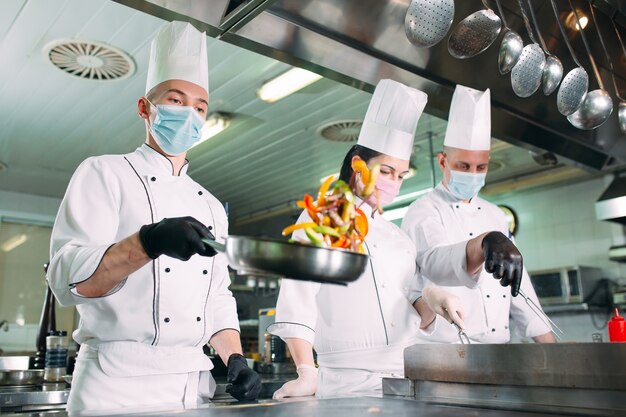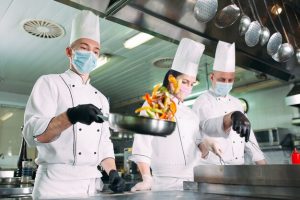- 6 August 2023
- 266
Surviving Extreme Heat in Kitchens: Coping Tips

Understanding the Impact of Extreme Heat in Kitchens
Working in a kitchen is already demanding, but when the temperature soars to 130 degrees, the challenges become unbearable. High-temperature environments pose serious risks to kitchen staff, including heatstroke, dehydration, and decreased productivity. Understanding the impact of extreme heat is the first step in implementing effective coping strategies.
Extreme heat can lead to dangerous situations if not managed properly. The body struggles to regulate its temperature, leading to heat-related illnesses. Additionally, hot surfaces and equipment can cause burns or accidents. Employers and employees must acknowledge these risks and work together to ensure a safe working environment.
Essential Safety Measures for Coping with 130 Degrees
To combat the sweltering temperatures in kitchens, specific safety measures are essential. Here are some effective tips for coping with extreme heat:
- Proper Ventilation and Cooling Systems: Ensure that the kitchen is equipped with adequate ventilation and cooling systems. Proper airflow can help dissipate heat and maintain a comfortable working environment.
- Wear Appropriate Clothing: Provide employees with breathable and lightweight uniforms. Loose-fitting, moisture-wicking clothing can help keep the body cool and prevent heat-related illnesses.
- Frequent Breaks in Cooler Areas: Encourage regular breaks in cooler areas of the kitchen. These breaks allow staff to rest and recover from the heat, reducing the risk of heat exhaustion.
- Hydration Stations: Set up hydration stations throughout the kitchen, offering cold water and electrolyte drinks to keep employees hydrated.
- Use Cooling Accessories: Use cooling accessories such as cooling towels or neck wraps to help lower body temperature during work hours.
- Limit Physical Exertion: Minimize physical exertion during peak heat hours to reduce strain on the body.
- Educate Staff on Heat Safety: Train employees about the risks of extreme heat and the importance of recognizing the early signs of heat-related illnesses.

Staying Hydrated and Avoiding Heat-Related Illnesses
One of the most crucial aspects of coping with extreme heat is staying properly hydrated. Dehydration can quickly lead to serious health issues and affect job performance. Here are some tips to stay hydrated and avoid heat-related illnesses:
- Drink Water Frequently: Encourage employees to drink water regularly, even if they don’t feel thirsty. Dehydration can set in quickly in high-temperature environments.
- Avoid Caffeinated and Sugary Drinks: While it’s essential to stay hydrated, sugary and caffeinated beverages can contribute to dehydration. Opt for water or electrolyte drinks instead.
- Monitor Urine Color: Use urine color as a quick indicator of hydration levels. Light yellow or straw-colored urine indicates proper hydration, while darker colors signal dehydration.
- Recognize the Signs of Heat Exhaustion: Educate staff about the early signs of heat exhaustion, such as dizziness, headache, excessive sweating, and fatigue. Prompt action is essential to prevent escalation.
- Provide Access to Shade: If possible, create shaded areas outside the kitchen where employees can take breaks.
Boosting Efficiency and Productivity in High-Temperature Kitchens
Despite the challenges, it is possible to maintain efficiency and productivity in high-temperature kitchens. Implement these strategies to keep the team functioning optimally:
- Optimize Work Schedules: Schedule more demanding tasks during cooler parts of the day and assign lighter duties during peak heat hours.
- Teamwork and Communication: Encourage teamwork and effective communication to streamline kitchen operations and reduce unnecessary movement in the heat.
- Utilize Insulated Gloves and Tools: Provide insulated gloves and utensils to reduce the risk of burns when handling hot equipment.
- Preparation and Organization: Ensure that all necessary ingredients and tools are prepared and organized before cooking begins. This reduces the time spent in the heat and increases overall efficiency.
- Stay Informed on Weather Conditions: Keep track of weather forecasts and be prepared for exceptionally hot days.
In conclusion,
coping with 130 degrees in kitchens requires a combination of safety measures, hydration, and efficiency-enhancing strategies. By understanding the impact of extreme heat and implementing these coping tips, kitchen staff can work safely and productively in challenging environments. Remember, the well-being of employees should always be the top priority, and proactive measures can prevent heat-related incidents and ensure a smooth kitchen operation.

